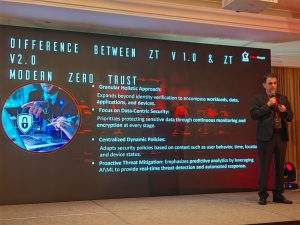
لا يمكننا إنكار تأثير التكنولوجيا المتسارع على حياتنا اليومية. فمنذ أعوام قليلة، لم نكن لنتخيل كيف سيصبح الذكاء الاصطناعي وإنترنت الأشياء والحوسبة السحابية جزءًا أساسيًا من واقعنا. اليوم، تقف البشرية أمام تحول جديد، وقد كشفت شركة جارتنر العالمية عن أهم 10 اتجاهات تكنولوجية لعام 2025، التي ستعيد تشكيل العالم.
لكن السؤال الأهم هو: كيف سنتعامل مع هذه الابتكارات؟ وهل نحن مستعدون للاستفادة منها أو تحمل مخاطرها؟
أولا: الذكاء الاصطناعي الوكيل (Agentic AI) وهو عبارة أنظمة ذكاء اصطناعي قادرة على التخطيط واتخاذ القرارات بشكل مستقل لتحقيق أهداف محددة من قبل المستخدم، مما يجعلها تعمل كوكيل يقوم بالمهام نيابة عن البشر، ولها تأثيرات إيجابية تشمل زيادة الكفاءة والإنتاجية وتوفير الوقت للتركيز على المهام الإبداعية وتحسين الخدمات كالرعاية الصحية والتعليم، وتأثيرات سلبية مثل فقدان الوظائف بسبب الأتمتة، والاعتماد المفرط على الآلات، واحتمالية حدوث أخطاء دون تدخل بشري.
ثانيا: منصات حوكمة الذكاء الاصطناعي (AI Governance Platforms) وهي منصات تضمن استخدام الذكاء الاصطناعي بشكل أخلاقي ومسؤول من خلال سياسات وإجراءات لإدارة المخاطر والأخلاقيات والامتثال القانوني، وتؤثر بشكل إيجابي على حماية الخصوصية وحقوق الأفراد، والحد من التحيز في الأنظمة، وزيادة الثقة بالتكنولوجيا، ولكنها قد تواجه سلبيات كصعوبة التطبيق والجهود التنظيمية اللازمة للامتثال.
ثالثا: أمن المعلومات المضللة (Disinformation Security) وهي تقنيات تهدف إلى كشف ومكافحة المعلومات المضللة من خلال التحقق من صحة المحتوى، مما ينعكس بشكل إيجابي على تحسين جودة المعلومات المتاحة وحماية المجتمعات من التضليل وتعزيز الوعي، لكنه قد يسبب سلبيات مثل قمع حرية التعبير أو الرقابة المفرطة إذا أُسيء استخدامه.
رابعاً: التشفير بعد الكمي (Postquantum Cryptography)وهي تقنيات تشفير مقاومة لهجمات الحوسبة الكمية لحماية البيانات الشخصية والمعاملات المالية، مما يوفر إيجابيات كتأمين الأنظمة الرقمية وزيادة الثقة بها، لكن بعض سلبياتها تشمل ارتفاع التكاليف والصعوبات المرتبطة بالانتقال إلى هذه التقنيات.
خامساً: الذكاء المحيطي غير المرئي (Ambient Invisible Intelligence)وهي أنظمة تستخدم أجهزة استشعار ذكية مدمجة في البيئة لتقديم خدمات دون تدخل المستخدم، مما يؤدي إلى تحسين الراحة والكفاءة اليومية (مثل المنازل الذكية)، لكنها قد تثير مخاوف الخصوصية وجمع البيانات دون علم المستخدمين، إضافة إلى خطر التعرض للاختراقات الأمنية.
سادساً: الحوسبة الموفرة للطاقة (Energy-Efficient Computing)وهي تقنيات تقلل استهلاك الطاقة لتعزيز الاستدامة البيئية وحماية البيئة وتقليل التكاليف، لكنها قد تتطلب استثمارات كبيرة في البنية التحتية، مما قد يزيد من تكاليف المنتجات والخدمات.
سابعاً: الحوسبة الهجينة (Hybrid Computing) وتعني الدمج بين تقنيات الحوسبة المختلفة لتقديم أداء أكثر كفاءة، مما يحسن سرعة التطبيقات ويدعم تقنيات متقدمة، لكنه قد يسبب تحديات تقنية وتعقيد في البنية التحتية بالإضافة إلى مسائل الأمان والخصوصية.
ثامناً: الحوسبة المكانية (Spatial Computing)وهي تقنيات تجمع العالم الرقمي مع المادي باستخدام الواقع المعزز والافتراضي، مما يقدم تجارب تفاعلية لتحسين التعليم والتدريب والابتكار، لكن الاعتماد المفرط عليها قد يسبب العزلة الاجتماعية ومخاوف تتعلق بالصحة النفسية.
تاسعاً: الروبوتات متعددة الوظائف (Polyfunctional Robots) وهي روبوتات تؤدي مهام متنوعة في بيئات مختلفة، مما يرفع الكفاءة في الصناعات والخدمات ويساعد في المهام الخطرة، لكنها قد يؤدي إلى فقدان الوظائف ومخاوف من تفاعل البشر مع الروبوتات في حياتهم اليومية.
عاشرا: التعزيز العصبي (Neurological Enhancement)وهي تقنيات لتحسين القدرات المعرفية البشرية من خلال قراءة وفك نشاط الدماغ، مما يعزز علاج الأمراض العصبية والتعلم، لكنها قد تثير قضايا أخلاقية تتعلق بالخصوصية والتلاعب بالعقول، إلى جانب تفاوت فرص الوصول لهذه التقنيات بين الأفراد.
وبناء على ذلك، أتساءل دائمًا، لماذا لا تكون لنا كعرب بصمة واضحة في هذا المستقبل التكنولوجي؟ فإذا أردنا المساهمة في هذا المشهد العالمي، علينا أن نستثمر في التعليم والبحث العلمي، وأن ندعم ريادة الأعمال ونوفر الحوافز للشركات الناشئة بشكل أكبر بكثير مما هو عليه، وأن نعزز الشراكات بين القطاعين العام والخاص والأكاديميا لتحقيق بيئة حاضنة للابتكار.
وختاما، أدعو الجميع إلى التفكير في كيفية استثمار هذه الاتجاهات لصالحنا، والبحث عن طرق نساهم بها في رسم هذا المستقبل، لا أن نكون مجرد متلقين لتأثيراته، ولنكن جزءًا من التحول، ولنصنع تقنياتنا بأيدينا.
*الرئيس التنفيذي لجمعية شركات تقنية المعلوةمات والاتصالات – انتاج











